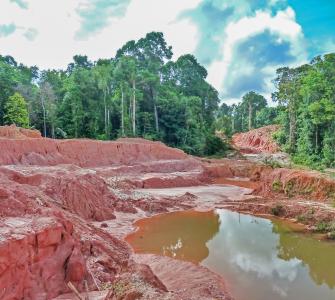Artisanal and small-scale gold mining (ASGM) poses a myriad of threats to human and environmental health, from contributing about 10% of all deforestation of the Amazon (1) to serving as the largest source of mercury pollution on Earth (2). In 2018, CSF partnered with the Federal Public Prosecutors Office of Brazil (MPF) to develop the Mining Impacts Calculator (MIC) to accurately assess the social and environmental costs of illegal gold mining activities in the region. Since then, we have been working to expand the MIC’s applicability to other countries impacted by ASGM.
In partnership with Conservation International (CI), EcoAgriculture Partners, and Rainforest Alliance, CSF will strengthen capacities in the utilization of the MIC tool, so the scale and impacts of damage caused by ASGM can reliably be assessed by various stakeholders and lead to a more environmentally and socially responsible sector. In this partnership CSF will lead two training workshops to introduce the 15 countries participating in planetGOLD (3) to the MIC.
After two initial training sessions with the 15 planetGOLD countries, CSF will choose 5 countries to receive further information about the MIC in the form of a virtual training webinar customized to fit each country's specific context. These webinars will train stakeholders in the use of the MIC for their country, and include:
- an impact assessment of deforestation, soil erosion, and mercury pollution on human and environmental health;
- exercises to help stakeholders practice using the MIC in the context of estimating values of environmental damages to: more accurately define compensation packages for prosecuting illegal activities, determine appropriate investment amounts for restoration, and justify the use of mercury-free technologies; and
- recommendations from the CSF team on next steps for integrating the MIC into each country’s policies.
Through these training webinars and recommendations, CSF and our partners aim to build a well-informed coalition of stakeholders who see the value of this tool, empower marginalized groups with the data needed to negotiate environmental protects and define their futures, identify financial mechanisms for transitions to sustainable systems, and create frameworks for evaluating and tracking sustainability in the mining sector.
We hope our MIC and training efforts equip stakeholders with the key training and tools necessary to advocate for the protection of environmental and human health.
(1) AmazonAID Foundation. (). Illicit and Unregulated Gold Mining. Retrieved from
https://amazonaid.org/threats-to-the-amazon/gold-mining/
(2) Esdaile LJ, Chalker JM. (2018, May 11). The Mercury Problem in Artisanal and Small-Scale Gold
Mining. Chem. Eur.J. 24; 6905-6916.
(3) The planetGOLD programme, supported by the Global Environment Facility (GEF), works in partnership with governments, the private sector, and ASGM communities to significantly improve the production practices and work environment of artisanal and small-scale miners. By working to close the financing gap, supporting formalization, raising awareness, and connecting mining communities with mercury-free technology and formal markets, the programme aims to demonstrate a pathway to cleaner and more efficient small-scale gold mining practices that benefit everyone, from mine to market.
__
Photo credit: kakteen/Shutterstock.com

